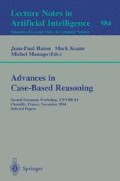Abstract
Current computer-chess programs achieve outstanding results in chess playing. However, there is a deficiency of evaluative comments on chess positions. In this paper, we propose a case-based model that supplies a comprehensive positional analysis for any given position. This analysis contains evaluative comments for the most significant basic features found in the position and a general evaluation for the entire position. The analysis of the entire position is presented by an appropriate Multiple explanation Pattern (MXP), while the analysis of each chosen feature is presented by a suitable eXplanation Pattern (XP). The proposed analysis can improve weak and intermediate players' play in general and their understanding, evaluating and planning abilities in particular. This model is part of an intelligent educational chess system which is under development. At present, our model deals only with a static evaluation of chess positions; addition of searching and playing modules remains for future work.
This research is in partial fulfillment of the requirements towards the degree of Ph.D. by the author under the supervision of Dr. Uri J. Schild at Bar-Ilan University. It was supported in part by the “Ben-Gurion Fund for the Encouragement of Research” Histadrut — The General Federation of Labour in Israel.
Preview
Unable to display preview. Download preview PDF.
References
Ashley, K. D. & Rissland, E. L. (1987). Compare and Contrast, A Test of Expertise. In Proceedings of the Sixth National Conference on Artificial Intelligence (pp. 273–278). Los Altos: Morgan Kaufmann.
Averbakh, Y. (ed.) (1986). Comprehensive Chess Endings (a five-volume set). Translated by Neat, K. P. Oxford: Pergamon Press.
Berliner, H. J. & Ackley, D. H. (1982). The QBKG System: Generating Explanations from a Non-Discrete Knowledge Representation. In Proceedings of the National Conference on Artificial Intelligence (pp. 213–216). AAAI Press.
Botvinnik, M. M. (1984). Computers in Chess: Solving Inexact Search Problems. Translated by Brown A. A. New York: Springer-Verlag.
Bradtke, S. & Lehnert, W. G. (1988). Some Experiments With Case-Based Search. In Proceedings of the Seventh National Conference on Artificial Intelligence (pp. 133–138). San Mateo: Morgan Kaufmann.
Branting, L. K. (1991). Reasoning with Portions of Precedents. In Proceedings of the Third International Conference on AI and Law (pp. 145–154). New York: ACM Press.
Callan, J. P., Fawcett, T. E. & Rissland, E. L. (1991). Adaptive Case-Based Reasoning. In Proceedings of a Workshop on CBR (pp. 179–190). San Mateo: Morgan Kaufman.
de Groot, A. D. (1965). Thought and Choice. Mouton, The Hague.
Epstein, S. (1989). The Intelligent Novice — Learning to Play Better. In D. N. L. Levy & D. F. Beal (Eds.), Heuristic Programming in Artificial Intelligence — The First Computer Olympiad. Ellis Horwood.
Fine, R. (1952). The Middle Game in Chess. New York: David McKay Company.
Kass, A. M. (1990). Developing Creative Hypotheses by Adapting Explanations. Technical Report #6, p. 9. Institute for the Learning Sciences, Northwestern University, U.S.A.
Kolodner, J. L. (1981). Organization and Retrieval in a Conceptual Memory for Events or Con54, Where are You? In Proceedings of the Seventh International Joint Conference on Artificial Intelligence (pp. 227–233). Los Altos: William Kaufmann.
Kolodner, J. L. (1988). Retrieving Events from a Case Memory: A Parallel Implementation. In Proceedings of a Workshop on CBR (pp. 233–249). San Mateo: Morgan Kaufman.
Koton, P. (1988). Reasoning about Evidence in Causal Explanations. In Proceedings of a Workshop on CBR (pp. 260–270). San Mateo: Morgan Kaufman.
Kotov, A. (1978). Play Like a Grandmaster. Translated by Cafferty, B. London: B. T. Batsford Ltd.
Levinson, R. & Snyder, R. (1991). Adaptive Pattern-Oriented Chess. In Proceedings of the Ninth National Conference on Artificial Intelligence (pp. 601–606). Menlo Park: AAAI Press/The MIT Press.
Levinson, R. (1994). Morph II: A Universal Agent: Progress Report and Proposal. Technical Report UCSC-CRL-94-22, University of California Santa Cruz.
Michie, D. (1981). A Theory of Evaluative Comments in Chess with a Note on Minimaxing. The Computer Journal, Vol. 24, No. 3, 278–286.
Nimzowitsch, A. (1930). My System — A Chess Treatise. New York: Harcourt, Brace and Company.
Pachman, L. (1973). Attack and Defence in Modern Chess Tactics. Translated by Clarke P. H. London: Routledge and Kegan Paul LTD.
Pachman, L. (1976). Complete Chess Strategy (Volumes 1 & 2). Translated by Littlewood J. London: B. T. Batsford Ltd.
Pell, B. (1994). A Strategic Metagame Player for General Chess-Like Game. In Proceedings of the Twelfth National Conference on Artificial Intelligence (pp. 1378–1385). Seattle: AAAI Press/The MIT Press.
Redmond, M. (1990). Distributed Cases for Case-Based Reasoning: Facilitating Use of Multiple Cases. In Proceedings of the Eight National Conference on Artificial Intelligence (pp. 304–309). Menlo Park: AAAI Press/The MIT Press.
Samuel, A. L. (1967). Some Studies in Machine Learning Using the Game of Checkers II-Recent Progress, IBM Journal of Research and Development, Vol. 11, No. 6, 601–617.
Schank, R.C. (ed.) (1986). Explanation Patterns: Understanding Mechanically and Creatively. Hillsdale: Lawrence Erlbaum.
Schild, U. J. & Kerner, Y. (1993). Multiple Explanation Patterns. In Proceedings of the First European Workshop on Case-Based Reasoning, Vol. II (pp. 379–384). Kaiserslautern: Germany. Extended paper in Wess, S.; Althoff, K-D.; and Richter, M. M. (Eds.), Topics in Case-Based Reasoning — EWCBR'93, Lecture Notes in Artificial Intelligence 837 (pp. 353–364). Berlin: Springer-Verlag, 1994.
Shannon, C. E. (1950). Programming a Computer for Playing Chess. Philosophical Magazine, Vol. 41(7), 256–277.
Shereshevsky M. I., (1985). Endgame Strategy. Translated by Neat, K. P. Oxford: Pergamon Press.
Simon, H. A. (1974). How Big is a Chunk? Science No. 183, 482–488.
Tversky, A. (1977). Features of Similarity, Psychological Review, 84, 4, 327–352.
Zobrist, A. L. (1970). Technical Report #88. Computer Science Department, University of Wisconsin, Madison, WI.
Author information
Authors and Affiliations
Editor information
Rights and permissions
Copyright information
© 1995 Springer-Verlag Berlin Heidelberg
About this paper
Cite this paper
Kerner, Y. (1995). Case-based evaluation in computer chess. In: Haton, JP., Keane, M., Manago, M. (eds) Advances in Case-Based Reasoning. EWCBR 1994. Lecture Notes in Computer Science, vol 984. Springer, Berlin, Heidelberg. https://doi.org/10.1007/3-540-60364-6_40
Download citation
DOI: https://doi.org/10.1007/3-540-60364-6_40
Published:
Publisher Name: Springer, Berlin, Heidelberg
Print ISBN: 978-3-540-60364-1
Online ISBN: 978-3-540-45052-8
eBook Packages: Springer Book Archive

